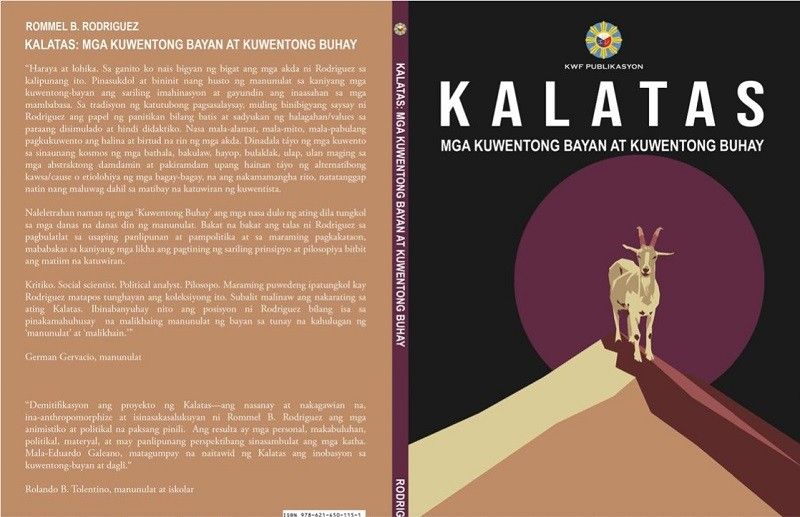Book author decries KWF censorship

MANILA, Philippines — One of the authors of the books allegedly ordered pulled out by commissioners of the Komisyon sa Wikang Filipino (KWF) lamented the said move by the agency, saying some words used in his work were taken out of context.
Last Tuesday, a program on Sonshine Media Network International (SMNI) titled “Lakas Kasama ang Bayan” featured KWF books that allegedly contained “subversive” messages and those influenced by communist rebels.
Among the books mentioned in the program, which was hosted by former National Task Force to End Local Communist Armed Conflict (NTF-ELCAC) spokesperson Lorraine Badoy, was “Kalatas: Mga Kuwentong Bayan at Kuwentong Buhay” by University of the Philippines (UP) literature and creative writing professor Rommel Rodriguez.
The program also displayed excerpts from the book, one of which read, “Gayunman, dahil sa isang tinig na sumakop sa lugar na inaakalang ganap na ang pag-angkin ng mga manlulupig, inilantad ang pananatili ng mga kasagutang hindi na nangangailangan ng tanong. Matagal nang may tugon sa mga ganitong uri ng bisitang paulit-ulit lamang na tinatanong, at walang iba ‘yon kundi rebolusyon,” with “at walang iba ‘yon kundi rebolusyon” highlighted.
Another quote in the book read, “May iba’t ibang dahilan ang tao kung bakit sila umaakyat ng bundok. Ang iba para mamasyal, ang maghanap ng adventure, ang saglit na takas an ang buhay sa siyudad. May iba para matuto, o para magsaliksik. Requirement sa klase o project para maka-graduate. May umaakyat ng bundok upang hanapin ang musang mailap at bihirang makita. May umaakyat ng bundok upang humawak ng sandata.” The last sentence was also underlined.
On the same day that the SMNI program was broadcast, KWF commissioners Carmela Abdurahman and Benjamin Mendillo Jr. issued a memorandum explicitly ordering that five books, including “Kalatas,” would be stopped from being printed and distributed.
The books allegedly contained “subversive” and “subliminal messages” that could violate Republic Act 11479 or the contentious Anti-Terrorism Act of 2020, according to the KWF order.
Speaking to “The Chiefs” on Cignal TV’S One News last Friday night, Rodriguez asserted that the words highlighted in the commentary program were “taken out of context.”
“They were taken out of context because after all, it is so easy to say they are subversive because they contained such words. Am I the only one who used ‘revolution’ and ‘weapon’? No. Many people in history have used them,” he said in English and Filipino.
He added that he wrote the book, including the highlighted words, with the intention of telling the facts and not encouraging people to take up arms and fight the government.
The author stressed that he would leave it to readers to provide their own context on his literary pieces.
“If their understanding is that my work is anti-government, for me this is how I understood what is happening in our country that I need to record as a writer,” he said.
Rodriguez, who does not hold a copy of his own book yet, also pointed out that before the controversial KWF memorandum, his book was “certified” for publication, and was eventually launched last April.
“As far as I know, there was a board of editors that examined my work, copyedited and did the layout. My documentary evidence was that I have the certification that my work underwent review process,” he said.
He added that his book “Kalatas” was available to readers of all ages. It featured a collection of folktales that discusses formation of social values, as well as short essays that tackle contemporary and social issues that he had witnessed.
In defense of his work, Rodriguez said tagging his book as “subversive” was a “very dangerous accusation.”
“It definitely has a chilling effect on the community of artists and writers. The writer would question if using certain words or being critical or writing about poverty and oppression is already prohibited,” he said.
“Perhaps, a good start would be to further popularize the value of arts and literature, that they serve a purpose, that they are rational and they are the reason why our artists and writers create. If you’re curtailing our freedom to create, censorship is our muse,” he added in Filipino and English.
CHR urges caution
Meanwhile, the Commission on Human Rights (CHR) has urged the KWF to further study its recent directive stopping the publication and distribution of books it tagged as “subversive” and “anti-government.”
CHR executive director Jacqueline de Guia said caution must also be exercised in interpreting the provisions of the Anti-Terrorism Act, which KWF commissioners cited as the basis of the directive.
De Guia asked the KWF to go into further inquiry on the contents of the publications, stressing that a safe and secure country is only possible if there are no infringements of rights to freedom of expression and speech. – Janvic Mateo
- Latest
- Trending































